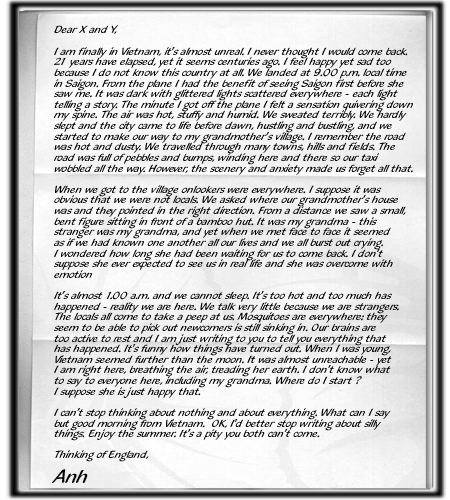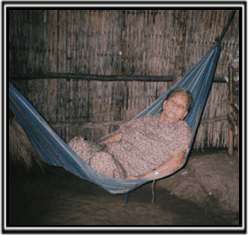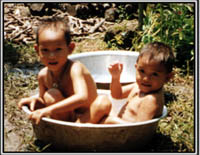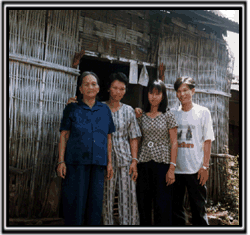 Vietnam - a tale of two sisters Kim and Anh are two sisters born near Haiphong in the north of Vietnam. Kim was born in 1972; her sister Anh in 1973. They were born to ethnic Chinese Vietnamese parents, a community actively persecuted by the native Vietnamese people. When Saigon fell and US troops left Vietnam in 1975, after more than 10 years of fighting and bombing, the persecution grew much worse. Land and property were seized and the family became so desperate that, in 1978, they fled by boat with a group of other ethnic Chinese. They had no idea where or when they would land. Kim was now 6, Anh was 5 and there was a new baby, Linh, who was only two months old. Kim: " I did not understand what was going on at the time. I liked to watch the fishes swimming under the water ... when I looked across the wide sea there was a spread of many boats just the same as us. I saw my mother holding my two sisters and she was in tears. Her eyes were very swollen - she had already been crying for a long time, but all of us children were too careless to notice then." They eventually found themselves on Hainan Island, part of China, but their troubles were far from over. They were herded into a camp and forced to clear areas of jungle to be used as farmland. Conditions in the camp were so bad that within months of arriving they escaped, again with no idea of their final destination. Kim: " My father had a bicycle and he put me and Anh on the back, both of us were mixed up with food and clothes. It was a great burden for my father - I remember how thin and tired he was. My mother had Linh on her back and also had to carry things like water and saucepans." They were chased into the jungle by the camp guards where they and the group they were with were involved in a vicious fight. Fortunately they managed to see off the guards who returned to the camp, certain that the refugees would not be able to survive. However, helped by some of the islanders, they did survive and stayed there for some time.
Kim: " No one can live without land ... I learnt that whilst adrift on the ocean for three weeks or more on the tiny fishing boat. After four days our food supplies ran out. Life was destitute without food and water, and that was when I yearned for my family and for land. It was so lonely out there, midway to nowhere, scary, lost, just floating at the ocean's mercy. The moon and the sun were our compass. The ocean wasn't kind, beating our little boat with big, lashing waves. At night she was just a big black monster, like a black hole.
When the weather was fine we roasted; when it rained we got soaked through - yet the rain was a blessing because it meant we had water to quench our thirst. We couldn't drink the ocean's water, it was so salty and it can kill, like poison. Everyone on the boat was sick - whether through hunger, thirst, disease or sea-sickness. People had hallucinations - one woman thought she saw the Lily Lady, the Buddhist Goddess of Mercy who lives on a lotus flower.
I was only eight years old and I had learnt how cheap life was, and about fighting for survival. I lost count of the days because they were no longer important. It's funny how when you've lost all hope of survival that your prayers are answered. A huge ship picked us up. She was so grand it was like the Titanic." Kim and Anh learned later of the terrible experiences of many other boat people. Some of the boats loaded with refugees were taken out to sea and deliberately sunk. Others were boarded by pirates and the occupants attacked and raped. Many starved at sea and there were stories of people being forced to drink their own urine to survive. However, Kim and Anh were 'lucky'. They were picked up from the South China Sea by a Danish ship which took them to Hong Kong where they were sent to one of the many refugee camps set up to house the huge numbers arriving from Indo China.
Anh: " At the beginning, life in the camp was fun. We had food (albeit very meagre) and we were in new land - Hong Kong. The conditions were poor, but I didn't know any better. There were about 200 children in our quarters. We slept in large huts, on 3 tier bunks which were always damp. The huts were dark and airless in summer and stuffy and smelly in winter. The water was a brown colour, not as clear as the sea water which carried me here. The food was weird, different, but we still ate everything. In those days you ate anything that was edible. You didn't wear shoes or underwear because you had none - you just ran wild in the children's concrete play area which we thought of as home. We all ate in a big hall where we also had our schooling for 2 hours a day, but we often skived off.
As the years went by my innocence passed - I was no longer oblivious to the high fences and barbed wire around the camp and the blue uniforms of the men at the gate. In fact I became angry about why we were kept locked up when we had committed no crime. I did know that we were not wanted and that the guards in the blue uniforms had whiter skin than us. As the days went by I got bored seeing the same unreachable fences, the same tangled wires, the same blue uniforms. I survived by learning to like boredom, boredom was the antidote to fear. But when boredom is combined with such cramped conditions, men start to fight over stupid things - one is from the north, the other is from the south ... so they argue and the arguments lead to fights.
At night those who were literate taught those who weren't, and sometimes we (the children) gathered round to listen to stories about the war, bedtime stories which we didn't always understand. Nights were noisy, men talking and babies crying. I don't think anyone was happy - people came, people went, some lived, some died ... that's how life was."
Anh: "In 1985 we left Hong Kong for England. This time the journey was different - we were to fly. At the airport I thought I was in a different world, everything was shiny, there was no dirt. When I saw the moving escalator I panicked, not knowing what to do. My sister, being older, offered to go first. As she took the first step it was fine. Then, a few seconds later the steps popped out where she was standing and she fell, rolling backwards. I screamed, convinced that she would be eaten up by the yellow lights at the bottom of the moving stairs. Looking back I can imagine how odd we must have seemed to other travellers, but neither of us had ever seen an escalator before.
I wasn't even aware that we had boarded the plane when we did - I thought we would have to climb steps up into it, but we had just walked through a tunnel. On the plane an air hostess kindly poured me a cup of tea. I thought it was a cup of muddy water and threw it onto the carpet. I wasn't being badly behaved - it was just sheer ignorance. As if this wasn't enough, I ended up crying and shouting for help inside the toilet, thinking I'd been locked up when I simply didn't know how to turn the handle to open the door.
At the beginning eating with a knife and fork was weird, the chocolate was too salty (it was actually SO sweet I thought it was salty), the custard looked revolting, milk was yuck and cheese was disgusting ... yet now I like all of them !
Then I started living and learnt a lot about myself. I now had access to a mirror and scrutinised my reflection - it was a novelty as I never knew what I looked like before. But as well as learning about myself I had to learn about my new school, a new language, a new country, a new culture and, above all, a new life. I was totally bewildered and lost at first, until, many years later I found myself." The sisters lived, with other Vietnamese refugee children, in a Save the Children home in west London. They talk vividly of their first memories of England and Anh remembers her first possession - a comb. They attended local schools and quickly learned to speak and write English. They worked hard and made good progress in their studies. They suffered some bullying at school and still find it hard to understand why some pupils resented their presence. When Kim was 18, they moved into a 'sheltered' house and became more independent. In 1991 the sisters went back to China with a Save the Children Field Officer. They had learned where their parents were and were re-united with them, their younger sister and brother Tan. They had been separated for 11 years. On the visit they discovered that they had a grandmother living in the south of Vietnam. Later that year their grandmother travelled to China to visit her daughter (Kim and Anh's mother). They had not seen each other since Kim's mother was just 3 months old. In 1994, Kim and Anh's parents, brother and sister came to England and the family was finally reunited and now live together again. In the summer of 1999 Kim and Anh went to Vietnam to visit their grandmother. They had seen photos of her house, a bamboo hut in a rural village 3 hours from Ho Chi Minh City (still called Saigon by many Vietnamese). It was an exciting but difficult and almost overwhelming encounter. Everyone in the small village came out to see them and other relatives travelled long distances to be there to be with them. Anh found the whole experience very challenging. She realises that she has become westernised and that hot and cold running water, baths, toilets, a sound roof over her head and easy communications are all essential parts of her life today. Kim was more adaptable but also found the basic living conditions very difficult. Both are saving as hard as they can to make sufficient money to build their grandmother, now in her 70's, a more solid house to replace the one-roomed bamboo shelter she lives in now and where they stayed. They say they feel guilty about having so much when she has so little. As Anh wrote in her letter to friends from her grandmother's house: "I don't know what to say to everyone here, including my grandma. Where do I start ?" It is now fourteen years since the sisters arrived in England. Both have University degrees and professional careers. They feel that they have made the best of the opportunities they have been offered since coming to this country, particularly in taking advantage of the education system, but still struggle with feelings of rejection from their homeland. Neither China nor Vietnam recognises their citizenship: they now have British passports but when they visited Vietnam this summer they felt very emotionally drawn to the country and were unsettled by their visit. However, they recognise and appreciate their good fortune in being reunited with their relatives. Not all families have been so lucky - they know of refugees who came with them from Hong Kong who have never heard from their relatives at all. There are some who found resettlement traumatic and suffered terrible depression. There are a few who have never emerged from the darkness of their early experiences. Though settled, life is not easy for Kim and Anh: money is short, their parents struggle with the English language, climate and culture and their father's health has been poor. They have found it hard to accept their parents' authority, which is culturally important, while at the same time supporting them in their adjustment to their new life. For years they have had to cope without the emotional support of their parents and there is a great deal of unspoken history between them. However, Kim and Anh remain cheerful and resilient and talk positively and hopefully about the future.
 The number of refugees or displaced persons across the world today numbers about 23 million .... over a third of the UK's population. Each person has a story to tell. Kim and Anh, just two of thousands of Vietnamese boat people, tell us just a small part their incredible story. Despite the extreme hardship they experienced, and the effect past events will always have on their lives, they are finally back together as a family, and last summer were able to visit their home country to meet relatives they had never seen before. We are very grateful to them for allowing us to publish their story and for the time they willingly gave up to tell it to us - especially as many of their memories were very difficult and painful to recall. Kim and Anh are now in their twenties, and are able to look back, as adults, upon what has happened them. The following short stories were written by students currently at a secondary school in West London. They are all fairly recent refugee arrivals in the UK, some having been here for just a few months. With the help of a member of staff at the school they have written about their first impressions.
Marion's Story... I left what was Czechoslovakia in May 1999 because my family were being called racist names. We were very unhappy there - and scared too. We went to Germany first and then we came to England. The first thing I noticed about England was how many cars there were - it was so busy. I live in a hotel at the moment. I went to school in England at the end of June. The teachers at school are very helpful and very nice and I am beginning to learn English very well. I am now very happy.
Louisa's Story .... My family - mother, father and younger sister who is five, had to leave Afghanistan because of the Taliban. My mother, who is a teacher, and father, who is a doctor, would have been killed if we had stayed there - we received death threats and had to leave very quickly. I came to England at the beginning of September (1999) and I started school straight away. I found it difficult at first because I knew only a few English words but I have met another girl at school who also speaks Russian and she has just arrived in England too. I am now very happy and I am enjoying school.
Amira's Story.... My family - my mother is a doctor, my father an engineer - left Somalia very quickly four years ago. We did not have any time to take anything with us. We went to live in Kenya and then the Arab Emirates, but we were sent back to Somalia. We had to leave Somalia, we had no future there. I came to England and joined a Middle School for a few months. I then went to High School. I am finding it very difficult to learn English and it is quite hard to make friends.
Suseka's Story.... I left Sri Lanka four years ago. It was very difficult for my family to live there because of all the troubles. I could not study properly there because we had to keep moving house and we were not happy. I am happy now though because the school and the teachers are very nice and I can study.
Saliman's Story... I left Kosovo two months ago with my father. My mother and family are still there. I had to leave with my father otherwise we would have been killed by the Serbs. We were airlifted out of Kosovo. I do not have any clothes, just my tracksuit and school uniform. I feel very sad at having left my family behind. I am lonely and do not like living in a hotel. I want to learn English and keep living in England. England is very good, life is easy here. I do not know whether I will go back home.
"One day we had to run" is the title of a book by Sybella Wilkes written for UNHCR and Save the Children. It contains stories and paintings by refugee children in Kenya, plus maps and background information. It is an excellent book for anyone wanting to know more about the lives of refugee children. Details: ISBN 0237-514893 (Evans) Price £12.99 If you are you a refugee and would like the opportunity to tell your story on our web site, contact us either by email or by post at Worldaware, 31-35 Kirby Street, London, EC1N 8TE. Please include your name, school and telephone number to enable us to get in touch with you. |


